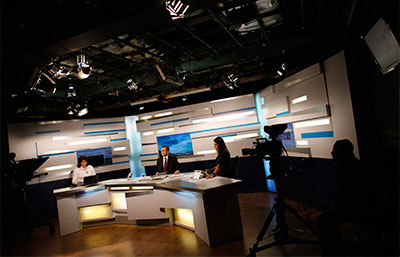That didn’t take long.
Nine days after the pro-opposition TV station Globovisión was sold to businessmen rumored to have close ties to the Venezuelan government, the station’s new leader was welcomed to Miraflores Palace for a cordial sit-down with President Nicolás Maduro.
“You all know why Globovisión could not come to Miraflores Palace” in the past, Globovisión President Juan Domingo Cordero told reporters after the May 21 meeting. “That’s never going to happen again.”
Cordero was referring Globovisión’s long-running battles with the late President Hugo Chávez, who died on March 5. As the conflict escalated, Chavez’s socialist government denied Globovisión reporters access to official events and information and barred government officials from appearing on the station.
Hit with huge government fines, losing money, and facing the probability that its license would not be renewed in 2015, the owners sold a majority stake of Globovisión to Cordero and two other businessmen. Cordero insisted that the new Globovisión would cover all sides of the news while working to reduce political tensions and promote peace. The government, in turn, signaled a truce by allowing Health Minister Isabel Iturria to appear on Globovisión on Tuesday this week.
“The conflict and fascist manipulation exercised by many right-wing elements in this country must end,” Vice President Jorge Arreaza, Chávez’s son-in-law, told reporters after attending the meeting. “The goal is to have a climate of peace in which the truth prevails.”
But some media analysts are troubled by the changes at Globovisión, even as they insist they support fair and balanced news coverage and acknowledge that Globovisión often went overboard in slamming the government and pumping up the opposition.
“You need to have some middle ground. It’s never good when a channel supports just one candidate or one political side,” Marianela Balbi, executive director of the Caracas-based Institute for Press and Society, told CPJ.
The problem, Balbi and others say, is that nearly all the other TV stations in Venezuela are either run by the state and serve as government mouthpieces or have shied away from critical coverage of the government because they fear reprisals. Globovisión was a lone government watchdog on TV and one of the few outlets where opposition viewpoints could reach a mass audience. It paid a steep price, including multimillion-dollar fines, for its editorial position.
In this lopsided TV landscape, Globovisión’s decision to chart a more moderate course could substantially reduce air time for government critics. Balbi pointed out that Globovisión has already cancelled two programs that often slammed government officials–“Aunque usted no lo crea” (You won’t believe this) and “Usted lo vió” (You saw it).
Globovisión has also discontinued its policy of providing wall-to-wall live coverage of speeches and press conferences by opposition politicians, such as Henrique Capriles, who lost to Maduro in last month’s presidential election.
“No media outlet is obligated to broadcast live or dedicate time to the declarations of a politician,” Globovisión said in a communiqué Monday.
Last week, Globovisión announced that opposition legislator Ismael García would no longer anchor the “Álo, Venezuela” news program. On Monday, Francisco Bautista, a part-time communications consultant for Capriles who hosted “Buenas noches,” a talk show critical of the government, announced on his Twitter account that he had been ousted from Globovisión and criticized “the censorship they are imposing.”
In its communiqué, Globovisión said García left by mutual accord and that Bautista was removed from his show for publicly criticizing García’s departure without first speaking with Globovisión executives about the issue.
As Globovisión distances itself from the opposition and aims for more balanced coverage, there is no sign that pro-government TV stations are following suit by toning down official propaganda and opening their microphones to critics, said Marcelino Bisbal, who heads the post-graduate journalism program at Andres Bello Catholic University in Caracas.
For now, most Globovisión journalists are staying put, including several marquee names. For example, the staunchly right-wing Leopoldo Castillo continues to host of the popular “Aló, Ciudadano” call-in program and to hammer away at the Maduro government.
“I know there is an information imbalance and that state-run media have become propaganda organs,” Castillo told viewers on Monday. “But Globovisión cannot be a battlefield trench that uses those same vices. The country demands something more.”
Still, the Globovisión brand was built on combative journalism and the station could lose legions of loyal viewers if it goes too soft on the Maduro government. Indeed, the station immediately lost more than 200,000 of its Twitter followers amid the controversy over the exit of García and Bautista.
Meanwhile, viewers disgruntled with the new Globovisión as well as opposition politicians looking to spread their message may end up relying more and more on social media. When he first learned of Globovisión’s new policy not to carry his speeches live, Capriles tweeted the news to his nearly 3.4 million followers.
“There were no press conferences, no microphones, and no reporters involved–just Henrique and his Twitter account,” wrote Juan Cristobal Nagel on the widely read blog Caracas Chronicles. “While it is tempting to be frightened at Globovisión’s demise, it’s possible that we may not need it in the end.”
